商务英语泛读讲稿
- 格式:doc
- 大小:124.00 KB
- 文档页数:18
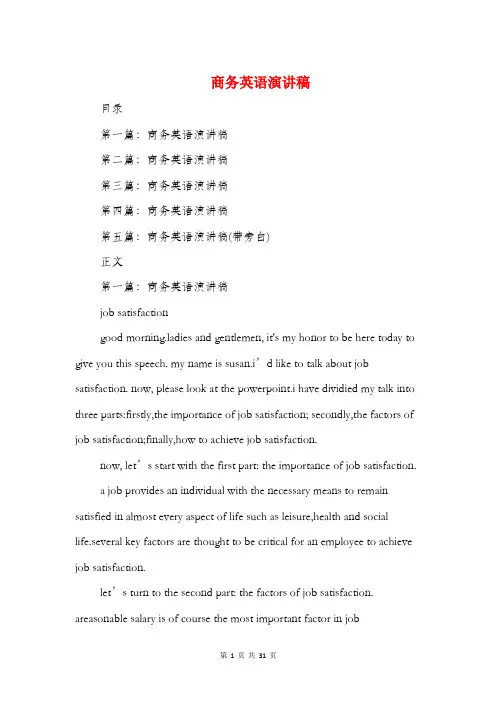
商务英语演讲稿目录第一篇:商务英语演讲稿第二篇:商务英语演讲稿第三篇:商务英语演讲稿第四篇:商务英语演讲稿第五篇:商务英语演讲稿(带旁白)正文第一篇:商务英语演讲稿job satisfactiongood dies and gentlemen, it's my honor to be here today to give you this speech. my name is susan.i’d like to talk about job satisfaction. now, please look at the powerpoint.i have dividied my talk into three parts:firstly,the importance of job satisfaction; secondly,the factors of job satisfaction;finally,how to achieve job satisfaction.now, let’s start with the first part: the importance of job satisfaction.a job provides an individual with the necessary means to remain satisfied in almost every aspect of life such as leisure,health and social life.several key factors are thought to be critical for an employee to achieve job satisfaction.let’s turn to the second part: the factors of job satisfaction. areasonable salary is of course the most important factor in job第1 页共31 页satisfaction.in many people’s minds,an ideal job is first of all a well-paid one, which makes the employee feel that he is fairly rewarded for what he has done for the pany.another important element of job satisfaction is the nature of the job itself. job satisfaction can never be achieved if the employee’seducation,skils and interests.finally,job satisfaction is closely associated with being part of the decision-making process in the pany as well as having opportunities for promotion..let’s leave that there, now, let’s e to the last part: how to achieve job satisfaction. for an individual employee,finding the right job and trying to stay positive minght be the first step towards achieving job fulfillment and satisfaction.i’ll briefly summarize the main parts. let me just run over the key points again. firstly,the importance of job satisfaction;secondly,the factors of job satisfaction;finally,how to achieve job satisfaction.in conclusion, job satisfaction plays an important role in the pany and individual.it is the key index to influence the pany performance.so we should try our best to achieve it.第二篇:商务英语演讲稿japan tankan survey shows business sentiment worseningjapan's big manufacturers have seen a slowdown in demand for their products from key marketscontinue reading the main storyrelated storieseconomic policies irk japanese businessesjapanese data suggests recessionjapan in second stimulus packagesentiment among japanese businesses worsened in the three months to december, the bank of japan's tankan survey has indicated, underlining the weakness in the country's economy.the survey's large manufacturers' index deteriorated to minus 12, from minus three in the previous quarter.japanese manufacturers have been hurt by slowing export demand, a strong yen and subdued domestic consumption.the index plays a role in driving the central bank's monetary policy."we can see sentiment is worsening across the board, whether in manufacturing or services," said hiroshi miyazaki, chief economist at shinkin asset management in tokyo."there are not any signs that sentiment will recover quickly," he added.stimulus boost?the index, which measures sentiment among large manufacturers, has remained negative for five successive quarters.the latest number es after revised growth figures earlier this week suggested the world's third-largest economy was in recession.continue reading the main storystart eif the bank of japan was leaning toward easing policy, this tankansurvey will give them a nudge in that direction”hiroshi miyazakishinkin asset managementjapan said its economy shrank by 0.9% between july and september.at the same time, the april to june quarter was revised from 0.1% growth to show a contraction of 0.03%, making it two successive quarters of contraction, or a technical recession.a shrinking economy, slowing demand for exports and sluggish domestic consumption have all contributed to calls for policymakers to implement new measures to help revive growth.japan has unveiled some initiatives, including a stimulus boost worth 880bn yen ($10.7bn; £6.7bn), announced last month, to create employment and support small businesses.however, there have been calls for the central bank to ease its policies further. analysts said given the sharp decline in sentiment, the bank may announce some measures soon."if the bank of japan was leaning toward easing policy, this tankan survey will give them a nudge in that direction," said mr miyazaki.日本短观调查显示商业景气恶化日本企业信心指数恶化的三个月,至12月,日本的短观调查的银行已经表示,强调在该国的经济疲软。
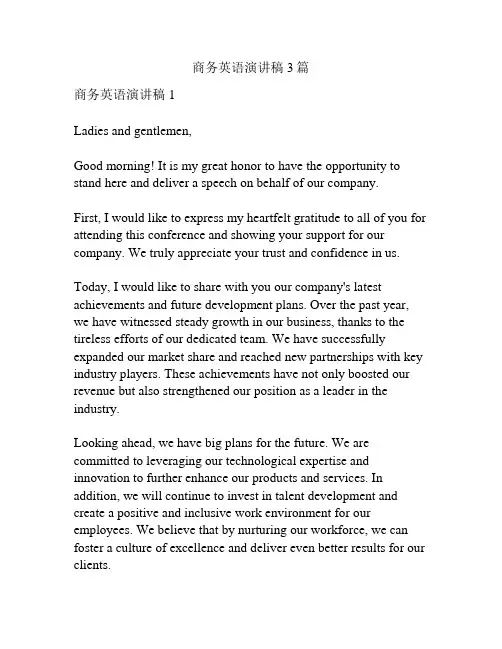
商务英语演讲稿3篇商务英语演讲稿1Ladies and gentlemen,Good morning! It is my great honor to have the opportunity to stand here and deliver a speech on behalf of our company.First, I would like to express my heartfelt gratitude to all of you for attending this conference and showing your support for our company. We truly appreciate your trust and confidence in us.Today, I would like to share with you our company's latest achievements and future development plans. Over the past year, we have witnessed steady growth in our business, thanks to the tireless efforts of our dedicated team. We have successfully expanded our market share and reached new partnerships with key industry players. These achievements have not only boosted our revenue but also strengthened our position as a leader in the industry.Looking ahead, we have big plans for the future. We are committed to leveraging our technological expertise and innovation to further enhance our products and services. In addition, we will continue to invest in talent development and create a positive and inclusive work environment for our employees. We believe that by nurturing our workforce, we can foster a culture of excellence and deliver even better results for our clients.Furthermore, we recognize the importance of corporate social responsibility and sustainable development. We are dedicated to making a positive impact on our community and environment. Through various initiatives such as charitable donations and eco-friendly practices, we aim to contribute to the well-being of society and leave a lasting legacy for future generations.In conclusion, I would like to once again express my gratitude for your support and reaffirm our commitment to excellence and sustainable growth. Together, let us embark on this exciting journey towards a brighter future.Thank you.商务英语演讲稿2Ladies and gentlemen,Good afternoon! It is my pleasure to have the opportunity to speak to you today.As we all know, the business landscape is constantly evolving, and staying competitive in today's global economy requires adaptability and innovation. In this fast-paced environment, effective communication is essential for success.In my role as a sales manager, I have learned the importance of clear and concise communication. Whether it is with clients, colleagues, or stakeholders, being able to convey your message in a compelling manner is crucial. This not only helps in buildingstrong relationships but also ensures that everyone is on the same page and working towards a common goal.In addition to verbal communication, written communication plays a vital role in the business world. It is essential to be able to convey your ideas and proposals in a concise and persuasive manner. This can make a significant difference in your ability to influence others and achieve your desired outcomes.In today's digital age, technology has further revolutionized how we communicate. With the advent of email, social media, and video conferencing, we have more ways than ever to connect with others. However, it is important to remember that technology should be used as a tool to enhance communication, not replace it. Face-to-face interactions still hold immense value and should not be overlooked.Finally, effective communication is not just about delivering your message but also about actively listening to others. By truly understanding their needs and concerns, you can tailor your communication to be more impactful and meaningful.In conclusion, I want to emphasize the importance of effective communication in the business world. By honing our communication skills and adapting to the changing landscape, we can navigate the challenges of today's business environment and achieve success.Thank you.商务英语演讲稿3Ladies and gentlemen,Good evening! It is a pleasure to be here today to discuss the roleof teamwork in the business world.In today's competitive business environment, teamwork has become a critical factor for success. No longer can individuals work in isolation and expect to achieve outstanding results. Instead, collaboration and cooperation are essential.Teamwork allows for the pooling of diverse skills, knowledge, and experiences. By bringing together individuals with different strengths and perspectives, teams can tackle complex challenges and come up with innovative solutions. The collective intelligence of a team is often greater than the sum of its parts, leading to better outcomes.Furthermore, teamwork fosters a sense of camaraderie and mutual support. When individuals work together towards a common goal, they feel a sense of belonging and are more motivated to give their best. This creates a positive work environment and enhances employee engagement and satisfaction.In addition, teamwork enables efficient resource allocation. By dividing tasks among team members based on their expertise, the workload can be shared and completed more effectively. This leads to increased productivity and faster project completion.However, effective teamwork does not happen automatically. It requires open communication, trust, and accountability. Team members must be able to communicate their ideas and concerns openly and without fear of judgment. They must trust each other and know that their ideas will be heard and valued. Furthermore, team members must hold themselves accountable for their actions and contribute fully to the team's success.In conclusion, teamwork is a crucial ingredient for success in the business world. By harnessing the power of collaboration and cooperation, organizations can achieve greater results and overcome challenges more effectively. Let us embrace the value of teamwork and create a culture that fosters collaboration and mutual support.Thank you.。
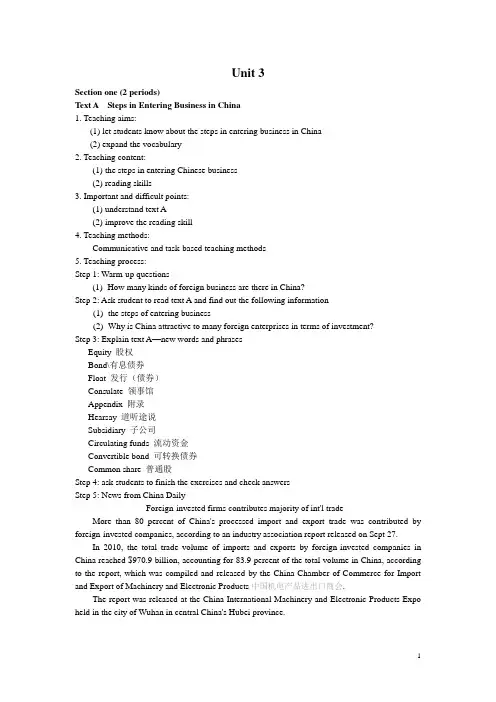
Unit 3Section one (2 periods)Text A Steps in Entering Business in China1. Teaching aims:(1) let students know about the steps in entering business in China(2) expand the vocabulary2. Teaching content:(1) the steps in entering Chinese business(2) reading skills3. Important and difficult points:(1) understand text A(2) improve the reading skill4. Teaching methods:Communicative and task-based teaching methods5. Teaching process:Step 1: Warm-up questions(1)How many kinds of foreign business are there in China?Step 2: Ask student to read text A and find out the following information(1)the steps of entering business(2)Why is China attractive to many foreign enterprises in terms of investment?Step 3: Explain text A—new words and phrasesEquity 股权Bond\有息债券Float 发行(债券)Consulate 领事馆Appendix 附录Hearsay 道听途说Subsidiary 子公司Circulating funds 流动资金Convertible bond 可转换债券Common share 普通股Step 4: ask students to finish the exercises and check answersStep 5: News from China DailyForeign-invested firms contributes majority of int'l tradeMore than 80 percent of China's processed import and export trade was contributed by foreign-invested companies, according to an industry association report released on Sept 27.In 2010, the total trade volume of imports and exports by foreign-invested companies in China reached $970.9 billion, accounting for 83.9 percent of the total volume in China, according to the report, which was compiled and released by the China Chamber of Commerce for Import and Export of Machinery and Electronic Products中国机电产品进出口商会.The report was released at the China International Machinery and Electronic Products Expo held in the city of Wuhan in central China's Hubei province.Foreign-invested companies have contributed an average of 81.57 percent of China's processed trade since 2001, according to Lu Jinyong, a professor from Beijing's University of International Business and Economics 国际经济贸易(UIBE).By taking advantage of China's cheap labor, foreign-invested companies have managed to reap most of the profits in the import-export industry, Lu said.Step 6: do fast reading: passage A and BSection two (2 periods)Text B No Job to go to?1. Teaching aims:(1) let students understand the story(2) expand the vocabulary2. Teaching content:(1) the reading skills(2)explain the story “No Job to Go to”(3) analyze Dick’s character3. Important and difficult points:(1) practice the reading skills4. Teaching methods:Communicative and task-based teaching methods5. Teaching process:Step 1: warm-up questions1)What job do you want to do in the future?2)What will you do if you lose your job?Step 2: Ask students to read the passage quickly and finish comprehension questions.How does Dick make ends meet?1. pays for his ticket out of redundancy money2. collects his dole weekly from DHSS3. skips tea4. does not pay for drinks in the bar5. reads newspapers discarded by other passengersWhat’s the situation in their home?They have very little furniture and give up TV.Dick wears old suit and worn shoes.How does Dick spend his day outside?Walks slowly along the river, sits in the park and makes friends with dogs, loiters, window shops, watches people go by, reads the papers in public library and sits through the opening hours, tramps back to Waterloo, feeds pigeon, walks past his old workplace, chats with someone he knew, bets on a horseHow does Dick manage to keep his wife in dark?Gets up early every weekday and leaves for work in his office suit with his briefcaseGives jean the same money he always didTells Jean his two ex-colleagues who dropped by his home were firedTells Jean he takes a pay cutDo you think his wife know the truth?Why does his wife pretended not knowing?Dick’s characterconcerned about face-savingstrong sense of self-respectStep 3: Ask students to read the passage loudly and try to do the vocabulary exercise.Step 4: Explanation of text B and ask students to translate this passageStep 5: Reading MaterialAsk students to read the following essay and talk about it.'I Hope You Dance... 'This was written by an 83-year-old woman to her friend.Dear Bertha,I'm reading more and dusting less. I'm sitting in the yard and admiring the view without fussing about the weeds in the garden. I'm spending more time with my family and friends and less time working.Whenever possible, life should be a pattern of experiences to savor, not to endure. I'm trying to recognize these moments now and cherish them.I'm not "saving" anything; we use our good china and crystal for every special event such as losing a pound, getting the sink unstopped, or the first Amaryllis blossom.I wear my good blazer to the market. My theory is if I look prosperous, I can shell out $28.49 for one small bag of groceries. I'm not saving my good perfume for special parties, but wearing it for clerks in the hardware store and tellers at the bank."Someday" and "one of these days" are losing their grip on my vocabulary. If it's worth seeing or hearing or doing, I want to see and hear and do it nowI'm not sure what others would've done had they known they wouldn't be here for the tomorrow that we all take for granted. I think they would have called family members and a few close friends. They might have called a few former friends to apologize and mend fences for past squabbles. I like to think they would have gone out for a Chinese dinner or for whatever their favorite food was.I'm guessing; I'll never know.It's those little things left undone that would make me angry if I knew my hours were limited. Angry because I hadn't written certain letters that I intended to write one of these days. Angry and sorry that I didn't tell my husband and parents often enough how much I truly love them.I'm trying very hard not to put off, hold back, or save anything that would add laughter and luster to our lives. And every morning when I open my eyes, tell myself that it is special.Every day, every minute, every breath truly is a gift from God.Unit 4Section one (2 periods)Text A Dell Cracks China1. Teachindg aims:(1) let students know about direct sell in China(2) expand the vocabulary2. Teaching content:(1) Dell’s direct sell model in china(2) reading skills3. Important and difficult points:(1) understand text A(2) improve the reading skill4. Teaching methods:Communicative and task-based teaching methods5. Teaching process:Step 1: Warm-up questions(2)How many kinds of foreign business are there in China?Step 2: Ask student to read text A and find out the following information(3)the steps of entering business(4)Why is China attractive to many foreign enterprises in terms of investment? Step 3: Explain text A—new words and phrasesdeputy general manager 副总billing system 计费系统eliminate 消除Fortune 财富杂志pay off 付清,取得成功asian crisis 亚洲金融危机retail buyer 零售买家at stake 危如累卵market share 市场份额rosy 美好的fretted 焦躁的internet penetration 网络普及率boon 福利,利益profit margin 毛利Gartner Group 高德纳咨询公司quarter-on-quarter 每个季度不同stated-owned companies国有公司sales pitch 销售语honey-tongued 甜言蜜语Step 4: ask students to finish the exercises and check answersStep 5: News from China DailyForeign-invested firms contributes majority of int'l tradeMore than 80 percent of China's processed import and export trade was contributed by foreign-invested companies, according to an industry association report released on Sept 27.In 2010, the total trade volume of imports and exports by foreign-invested companies in China reached $970.9 billion, accounting for 83.9 percent of the total volume in China, according to the report, which was compiled and released by the China Chamber of Commerce for Import and Export of Machinery and Electronic Products中国机电产品进出口商会.The report was released at the China International Machinery and Electronic Products Expo held in the city of Wuhan in central China's Hubei province.Foreign-invested companies have contributed an average of 81.57 percent of China's processed trade since 2001, according to Lu Jinyong, a professor from Beijing's University of International Business and Economics 国际经济贸易(UIBE).By taking advantage of China's cheap labor, foreign-invested companies have managed to reap most of the profits in the import-export industry, Lu said.Step 6: do fast reading: passage A and BSection two (2 periods)Text B No Job to go to?1. Teaching aims:(1) let students understand the story(2) expand the vocabulary2. Teaching content:(1) the reading skills(2)explain the story “No Job to Go to”(3) analyze Dick’s character3. Important and difficult points:(1) practice the reading skills4. Teaching methods:Communicative and task-based teaching methods5. Teaching process:Step 1: warm-up questions1)What job do you want to do in the future?2)What will you do if you lose your job?Step 2: Ask students to read the passage quickly and finish comprehension questions.How does Dick make ends meet?1. pays for his ticket out of redundancy money2. collects his dole weekly from DHSS3. skips tea4. does not pay for drinks in the bar5. reads newspapers discarded by other passengersWhat’s the situation in their home?They have very little furniture and give up TV.Dick wears old suit and worn shoes.How does Dick spend his day outside?Walks slowly along the river, sits in the park and makes friends with dogs, loiters, windowshops, watches people go by, reads the papers in public library and sits through the opening hours, tramps back to Waterloo, feeds pigeon, walks past his old workplace, chats with someone he knew, bets on a horseHow does Dick manage to keep his wife in dark?Gets up early every weekday and leaves for work in his office suit with his briefcaseGives jean the same money he always didTells Jean his two ex-colleagues who dropped by his home were firedTells Jean he takes a pay cutDo you think his wife know the truth?Why does his wife pretended not knowing?Dick’s characterconcerned about face-savingstrong sense of self-respectStep 3: Ask students to read the passage loudly and try to do the vocabulary exercise.Step 4: Explanation of text B and ask students to translate this passageStep 5: Reading MaterialAsk students to read the following essay and talk about it.1. A for effort!Recognizing that someone tried hard to accomplish something although they might not have been successful.某人尽管努力了但是还是没有成功。
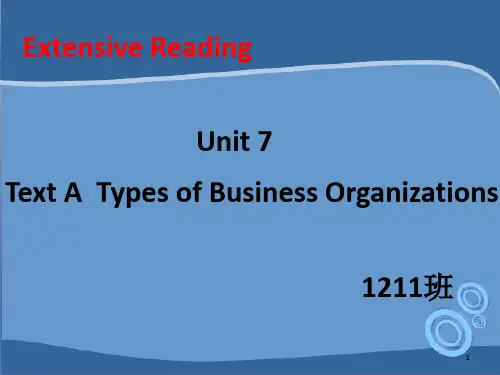
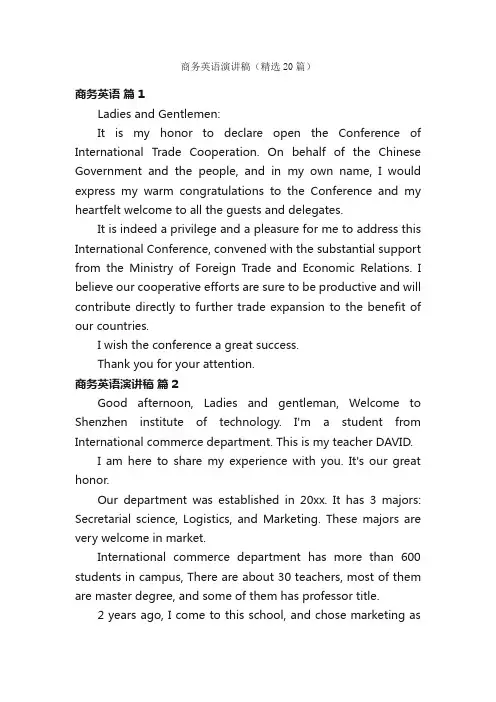
商务英语演讲稿(精选20篇)商务英语篇1Ladies and Gentlemen:It is my honor to declare open the Conference of International Trade Cooperation. On behalf of the Chinese Government and the people, and in my own name, I would express my warm congratulations to the Conference and my heartfelt welcome to all the guests and delegates.It is indeed a privilege and a pleasure for me to address this International Conference, convened with the substantial support from the Ministry of Foreign Trade and Economic Relations. I believe our cooperative efforts are sure to be productive and will contribute directly to further trade expansion to the benefit of our countries.I wish the conference a great success.Thank you for your attention.商务英语演讲稿篇2Good afternoon, Ladies and gentleman, Welcome to Shenzhen institute of technology. I'm a student from International commerce department. This is my teacher DAVID.I am here to share my experience with you. It's our great honor.Our department was established in 20xx. It has 3 majors: Secretarial science, Logistics, and Marketing. These majors are very welcome in market.International commerce department has more than 600 students in campus, There are about 30 teachers, most of them are master degree, and some of them has professor title.2 years ago, I come to this school, and chose marketing asmy major. I feel great here. Our teachers are always patient and dedicated. They share the commercial knowledge and experience in the class, and offer the opportunities to practice in enterprise.Yes, our department has set up relationship with many companies. Some of them are the world well-known enterprise. Such as Ikea, Ups, Konca, Maesk, Lenovo, Walmark, and so on.There are also many profession competitions in our department sponsored by the companies. I take part in the selling competition this years. I've got the final championship.Congratulations!Besides the competitions inside our school, we encourage students to join the national-wide competitions. Compete with the national-wide colleges and universities. 20xx, we won the championship of National secretary competition. 20xx, we won the second prize of National high school marketing competition, first prize of Guangdong province sand board competition. The logistics major is rank as top 10 logistics education brand.Well, it's amazing. I wish one day I would be the championship of the national competition.Sure, you can. There're many excellent students grow up in International commerce department. And they succeeded in their career.I know. One marketing graduation WTW, who was promoted as a manager in Centaline company., he is now in charge of the Luohu district real-estate selling. WJR, who was graduated from logistics major, has became a senior supervisor in a large logistics company 2 years later after his graduation.LQ, Secretarial science graduation, has been working in a computer enterprise as a secretary for 2years. Now she is running her owned IT company in Shenzhen.There are still many outstanding students start their career from our department. We're all witnesses. I'm hope I will became a successful marketing manager.Hold on to your dream and put more effort with your heart.I have many unforgettable experience in our department. We win the general champion of the school sports. Our dancing team win dancing competition of school. We have many wonderful parties. I think we are probably the best department in the school. I'm so proud of it.We are also proud of our student .Please keep in mind, the philosophy of our department: to be professional, to be passion, to be responsibility, to be successful.Yes, I have kept it in mind.Today I share my experience of my department. I grow up with confidence here. I beliefe I will be succeeded in the future. I want to tell everybody here, I love this department.Yes, international commerce department is the place where amazing happens, where success happens. Thank you.商务英语演讲稿篇3Ladies and Gentlemen,Our seminar had lasted four days. It has achieved tremendous success. More than 20 professors and scholars spoke at the conference. Many more aired their views freely at group discussions, which proceeded in a friendly and lively atmosphere. We all benefited greatly by attending this conference.Science and technology are a kind of wealth created in common by mankind. They must in turn serve the needs of all the people and work for the interest of world peace. Any nation or country must learn from the strong points of other nations ofcountries, from their advanced science and technology. Let's join hands and explore the boundless universe in quest of the never-ending truth of science.Ladies and Gentlemen, you have my best wishes for your still greater achievements in your career of science.Now, I declare the conference closed.Thank you商务英语演讲稿篇4since the quality of honesty applies to all behaviors, one cannot refuse to consider factual information, for example, in an unbiased manner and still claim that one's knowledge, belief or position is an attempt to be truthful. such a belief is clearly a product of one's desires and simply has nothing to do with the human ability to know. basing one's positions on what one wants — rather than unbiased evidence gathering — is dishonest even when good intentions can be cited — after all even hitler could cite good intentions and intended glory for a select group of people. clearly then, an unbiased approach to the truth is a requirement of honesty.because intentions are closely related to fairness and certainly affect the degree of honesty/dishonesty, there is a wide spread confusion about honesty--and a general belief that being dishonest means that one always correctly understands if their behavior is either honest or dishonest. self-perception of our morality is non-static and volatile. it's often at the moment we refuse to consider other perspectives that there is a clear indication we are not pursuing the truth, rather than simply and exclusively at the moment we can muster up evidence that we are right. socrates had much to say about truth, honesty and morality, and explained that if people really understood that theirbehavior was wrong —then they simply wouldn't do it —by definition. unfortunately, honesty in the western tradition has been marginalized to specific instances —perhaps because a thorough understanding of honesty collides with ideologies of all types. ideologies and idealism often exaggerate and suppress evidence in order to support their perspectives — at the expense of the truth. this process erodes the practice and understanding of honesty. to an ideologist the truth quite often becomes insignificant, what matters most are their ideals and what ever supports their desires to enjoy and spread those ideals.human beings are inherently biased about what they believe to be good due to individual tastes & backgrounds, but once one understands that a decidedly biased approach to what is true —is inherently dishonest, one can also understand how idealism and ideology have poorly served the quest for an honest, moral society. both honesty and morality require that we base our opinions about what is good — upon unbiased ideas of what is true — rather than vice versa (determining what is true based on what we feel is good) — the way all ideologies would have us believe.商务英语演讲稿篇5Knowledge collaboration and all-round educationLadies and gentlemen,We engineering students take it for granted that technology is changing incredibly fast. We are thinking nervously and seriously whether our colleges are failing to provide a foundation in the skills currently needed in industry. Take my major telecommunications for example. Scientists say that 21st century is a biomedical time, not an electrical time. But without the help of electronic data processing and transformation, biomedicaltechnology alone cannot go too far. Funny enough, the word biomedical itself is just a combination of two disciplines. So the interdisciplinary exploitation serves as the critical part for our electric and electronics world as well as any other fields to find new way of being.But the power of knowledge collaboration is certainly not restricted to science and engineering; it is in the full community of learning. Walking around campus I absorbed a reality that there is a seamless web between students from different professional backgrounds. The engineering students are discussing animatedly in a philosophy lecture, speaking passionately in the public speaking club, and looking for sparkling ideas from learning history and arts. How wonderful that is! That, ladies and gentleman, is just a significant step forward to be well-rounded because once we jump out of the circle we can see the bigger picture.My friends, I hope that you have already got what university is all about. Please let me end my speech with the Nobel Prize winner Li Zhengdao’s words: “The realization of the perfect combination of science and engineering, science and arts, technology and humanity,is the greatest symbol of a university’s success.” Thank you.知识的融合和人才的全面发展我们理工科的学生都知道科技在以一种难以置信的速度变化发展着。

商务英语演讲稿目录第一篇:商务英语演讲稿第二篇:商务英语演讲稿第三篇:商务英语演讲稿第四篇:商务英语演讲稿第五篇:商务英语演讲稿(带旁白)正文第一篇:商务英语演讲稿job satisfactiongood dies and gentlemen, it's my honor to be here today to give you this speech. my name is susan.i’d like to talk about job satisfaction. now, please look at the powerpoint.i have dividied my talk into threeparts:firstly,the importance of job satisfaction;secondly,the factors of job satisfaction;finally,how to achieve job satisfaction.now, let’s start with the first part: the importance of job satisfaction.a job provides an individual with the necessary means to remain satisfied in almost every aspect of life such as leisure,health and social life.several key factors arethought to be critical for an employee to achieve job satisfaction.let’s turn to the second part: the factors of job satisfaction. areasonable salary is of course the most important factor in job satisfaction.in many people’s minds,an ideal job is first of all a well-paid one, which makes the employee feel that he is fairly rewarded for what he has done for the pany.another important element of job satisfaction is the nature of the job itself. job satisfaction can never be achieved if theemployee’seducation,skils and interests.finally,job satisfaction is closely associated with being part of the decision-making process in the pany as well as having opportunities for promotion..let’s leave that there, now, let’s e to the last part: how to achieve job satisfaction. for an individual employee,finding the right job and trying to stay positive minght be the first step towards achieving job fulfillment and satisfaction.i’ll briefly summarize the main parts. let me just run over the key points again. firstly,the importance of job satisfaction;secondly,the factors of jobsatisfaction;finally,how to achieve job satisfaction.in conclusion, job satisfaction plays an important role in the pany and individual.it is the key index to influence the pany performance.so we should try our best to achieve it.第二篇:商务英语演讲稿japan tankan survey shows business sentiment worseningjapan's big manufacturers have seen a slowdown in demand for their products from key marketscontinue reading the main storyrelated storieseconomic policies irk japanese businessesjapanese data suggests recessionjapan in second stimulus packagesentiment among japanese businesses worsened in the three months to december, the bank of japan's tankan survey has indicated, underlining the weakness in the country's economy.the survey's large manufacturers' index deteriorated to minus 12, from minus three in the previous quarter.japanese manufacturers have been hurt by slowing export demand, a strong yen and subdued domestic consumption.the index plays a role in driving the central bank's monetary policy."we can see sentiment is worsening across the board, whether in manufacturing or services," said hiroshi miyazaki, chief economist at shinkin asset management in tokyo."there are not any signs that sentiment will recover quickly," he added.stimulus boost?the index, which measures sentiment among large manufacturers, has remained negative for five successive quarters.the latest number es after revised growth figures earlier this week suggested the world's third-largest economy was in recession.continue reading the main storystart eif the bank of japan was leaning toward easing policy, this tankan survey will give them a nudge in that direction”hiroshi miyazakishinkin asset managementjapan said its economy shrank by 0.9% between july and september.at the same time, the april to june quarter was revised from 0.1% growth to show a contraction of 0.03%, making it two successive quarters of contraction, or a technical recession.a shrinking economy, slowing demand for exports and sluggish domestic consumption have all contributed to callsfor policymakers to implement new measures to help revive growth.japan has unveiled some initiatives, including a stimulus boost worth 880bn yen ($10.7bn; £6.7bn), announced last month, to create employment and support small businesses.however, there have been calls for the central bank to ease its policies further. analysts said given the sharp decline in sentiment, the bank may announce some measures soon."if the bank of japan was leaning toward easing policy, this tankan survey will give them a nudge in that direction," said mr miyazaki.日本短观调查显示商业景气恶化日本企业信心指数恶化的三个月,至12月,日本的短观调查的银行已经表示,强调在该国的经济疲软。
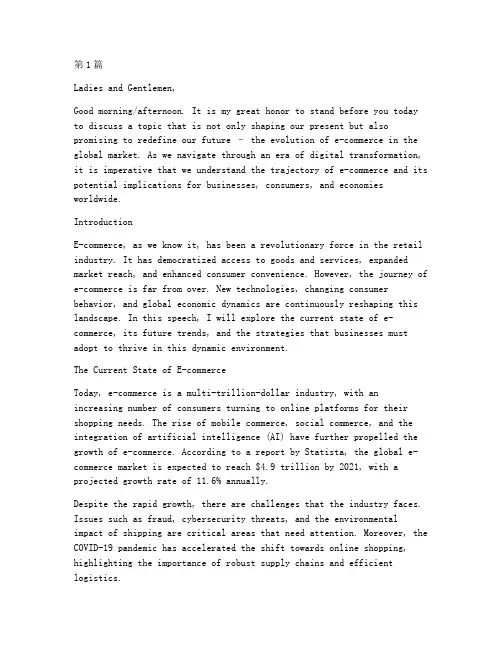
第1篇Ladies and Gentlemen,Good morning/afternoon. It is my great honor to stand before you today to discuss a topic that is not only shaping our present but also promising to redefine our future – the evolution of e-commerce in the global market. As we navigate through an era of digital transformation, it is imperative that we understand the trajectory of e-commerce and its potential implications for businesses, consumers, and economies worldwide.IntroductionE-commerce, as we know it, has been a revolutionary force in the retail industry. It has democratized access to goods and services, expanded market reach, and enhanced consumer convenience. However, the journey of e-commerce is far from over. New technologies, changing consumer behavior, and global economic dynamics are continuously reshaping this landscape. In this speech, I will explore the current state of e-commerce, its future trends, and the strategies that businesses must adopt to thrive in this dynamic environment.The Current State of E-commerceToday, e-commerce is a multi-trillion-dollar industry, with an increasing number of consumers turning to online platforms for their shopping needs. The rise of mobile commerce, social commerce, and the integration of artificial intelligence (AI) have further propelled the growth of e-commerce. According to a report by Statista, the global e-commerce market is expected to reach $4.9 trillion by 2021, with a projected growth rate of 11.6% annually.Despite the rapid growth, there are challenges that the industry faces. Issues such as fraud, cybersecurity threats, and the environmental impact of shipping are critical areas that need attention. Moreover, the COVID-19 pandemic has accelerated the shift towards online shopping, highlighting the importance of robust supply chains and efficient logistics.Future Trends in E-commerce1. Personalization and AI: The use of AI and machine learning algorithms will enable e-commerce platforms to offer highly personalized shopping experiences. By analyzing consumer behavior, preferences, and purchasing history, businesses can tailor their offerings to individual customers, leading to increased customer satisfaction and loyalty.2. Augmented Reality (AR) and Virtual Reality (VR): AR and VR technologies will revolutionize the way consumers interact with products. By allowing customers to visualize products in their own environment, these technologies will enhance the online shopping experience andreduce the likelihood of returns.3. Sustainability: As consumers become more environmentally conscious, businesses will need to adopt sustainable practices in their e-commerce operations. This includes using eco-friendly packaging, optimizing logistics to reduce carbon emissions, and promoting circular economy models.4. Cross-border E-commerce: The growth of cross-border e-commerce will continue to expand, with consumers seeking unique products and competitive pricing from around the world. This trend will require businesses to navigate complex regulatory environments and ensure compliance with international standards.5. Blockchain Technology: Blockchain can enhance the security and transparency of e-commerce transactions. By creating a decentralized and immutable ledger, blockchain can help reduce fraud and increase trust in online transactions.Strategies for Businesses to Thrive in the Future of E-commerce1. Invest in Technology: Businesses must invest in the latest technologies to stay competitive. This includes AI, AR/VR, andblockchain solutions that can improve operational efficiency and customer experience.2. Focus on Customer Experience: Prioritize customer satisfaction by offering personalized experiences, efficient customer service, and easy-to-navigate platforms.3. Develop Strong Supply Chains: Build resilient supply chains that can adapt to changing market conditions and disruptions, such as those caused by the pandemic.4. Embrace Sustainability: Adopt sustainable practices to reduce the environmental impact of e-commerce operations and meet the expectations of environmentally conscious consumers.5. Expand Internationally: Explore opportunities in cross-border e-commerce to tap into new markets and increase sales.ConclusionThe future of e-commerce is bright, with immense potential for innovation and growth. By embracing the latest technologies, focusing on customer experience, and adopting sustainable practices, businesses can navigate the challenges and thrive in this dynamic environment. As we move forward, it is crucial to remain adaptable and forward-thinking, ensuring that we are well-prepared for the future of e-commerce.Thank you for your attention, and I welcome any questions you may have regarding the future of e-commerce in the global market.[The End]---This speech provides a comprehensive overview of the current state and future trends of e-commerce, along with strategies for businesses to adapt and succeed. It is designed to be informative and thought-provoking, encouraging further discussion and exploration of the topic.第2篇Ladies and Gentlemen,Good morning/afternoon. It is a great pleasure to stand before you today to discuss a topic that is not only shaping our present but also dictating our future: the world of e-commerce. As we delve into this dynamic and rapidly evolving sector, it is crucial to understand the opportunities it presents as well as the challenges it poses. I will outline these key aspects in the following speech.Introduction: The Rise of E-commerceTo begin, let us acknowledge the meteoric growth of e-commerce in recent years. With the advent of the internet and the proliferation of smartphones, online shopping has become an integral part of our daily lives. According to a report by Statista, global e-commerce sales are projected to reach $5.5 trillion by 2022, marking a significant increase from the $2.3 trillion in 2017. This exponential growth is a testament to the changing consumer behavior and the increasing reliance on digital platforms for shopping.Opportunities in E-commerce1. Market Expansion: E-commerce has打破了地域限制,为企业和消费者提供了无限的市场空间。
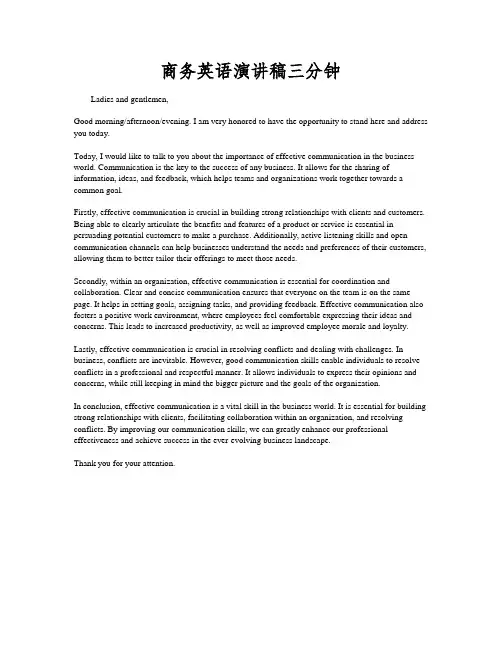
商务英语演讲稿三分钟Ladies and gentlemen,Good morning/afternoon/evening. I am very honored to have the opportunity to stand here and address you today.Today, I would like to talk to you about the importance of effective communication in the business world. Communication is the key to the success of any business. It allows for the sharing of information, ideas, and feedback, which helps teams and organizations work together towards a common goal.Firstly, effective communication is crucial in building strong relationships with clients and customers. Being able to clearly articulate the benefits and features of a product or service is essential in persuading potential customers to make a purchase. Additionally, active listening skills and open communication channels can help businesses understand the needs and preferences of their customers, allowing them to better tailor their offerings to meet those needs.Secondly, within an organization, effective communication is essential for coordination and collaboration. Clear and concise communication ensures that everyone on the team is on the same page. It helps in setting goals, assigning tasks, and providing feedback. Effective communication also fosters a positive work environment, where employees feel comfortable expressing their ideas and concerns. This leads to increased productivity, as well as improved employee morale and loyalty.Lastly, effective communication is crucial in resolving conflicts and dealing with challenges. In business, conflicts are inevitable. However, good communication skills enable individuals to resolve conflicts in a professional and respectful manner. It allows individuals to express their opinions and concerns, while still keeping in mind the bigger picture and the goals of the organization.In conclusion, effective communication is a vital skill in the business world. It is essential for building strong relationships with clients, facilitating collaboration within an organization, and resolving conflicts. By improving our communication skills, we can greatly enhance our professional effectiveness and achieve success in the ever-evolving business landscape.Thank you for your attention.。


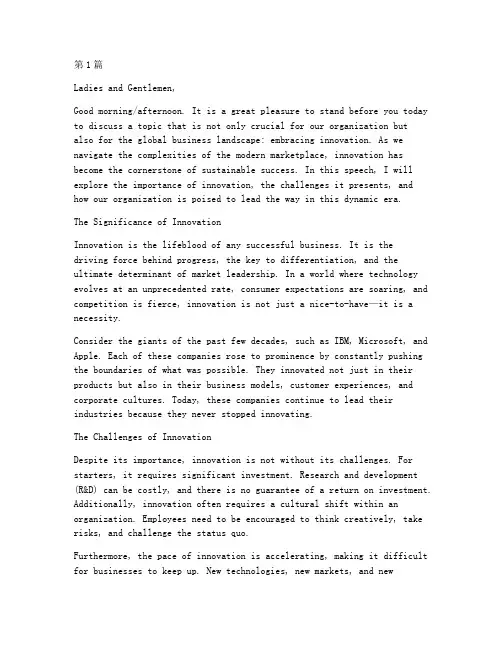
第1篇Ladies and Gentlemen,Good morning/afternoon. It is a great pleasure to stand before you today to discuss a topic that is not only crucial for our organization butalso for the global business landscape: embracing innovation. As we navigate the complexities of the modern marketplace, innovation has become the cornerstone of sustainable success. In this speech, I will explore the importance of innovation, the challenges it presents, and how our organization is poised to lead the way in this dynamic era.The Significance of InnovationInnovation is the lifeblood of any successful business. It is thedriving force behind progress, the key to differentiation, and the ultimate determinant of market leadership. In a world where technology evolves at an unprecedented rate, consumer expectations are soaring, and competition is fierce, innovation is not just a nice-to-have—it is a necessity.Consider the giants of the past few decades, such as IBM, Microsoft, and Apple. Each of these companies rose to prominence by constantly pushing the boundaries of what was possible. They innovated not just in their products but also in their business models, customer experiences, and corporate cultures. Today, these companies continue to lead their industries because they never stopped innovating.The Challenges of InnovationDespite its importance, innovation is not without its challenges. For starters, it requires significant investment. Research and development (R&D) can be costly, and there is no guarantee of a return on investment. Additionally, innovation often requires a cultural shift within an organization. Employees need to be encouraged to think creatively, take risks, and challenge the status quo.Furthermore, the pace of innovation is accelerating, making it difficult for businesses to keep up. New technologies, new markets, and newcompetitors emerge almost daily, and businesses must be agile and adaptable to survive.Our Approach to InnovationAt [Your Company Name], we understand the critical role of innovation in our success. That's why we have developed a comprehensive approach to fostering innovation within our organization:1. Investing in R&D: We allocate a substantial portion of our budget to R&D, ensuring that we are at the forefront of technological advancements and market trends.2. Creating a Culture of Innovation: We have fostered a culture that encourages creativity and risk-taking. Employees are rewarded for their innovative ideas, and we provide the resources and support necessary to bring these ideas to life.3. Collaborating with External Partners: We recognize that innovation doesn't happen in a vacuum. By partnering with academic institutions, startups, and other industry leaders, we gain access to new ideas and expertise.4. Leveraging Data and Analytics: We use data and analytics to inform our innovation strategies, ensuring that our investments are aligned with market needs and consumer preferences.5. Prioritizing Customer Experience: We are committed to delivering exceptional customer experiences through innovative products and services that solve real-world problems.Case Study: Our New Product LineTo illustrate our commitment to innovation, let me share a case study of our latest product line. Last year, we identified a gap in the marketfor a product that combined advanced technology with user-friendly design. Our R&D team worked tirelessly to develop a prototype, and our marketing team conducted extensive market research to ensure we understood our target audience.The result? A product that has been praised for its innovation, ease of use, and affordability. Since its launch, this product has not only gained significant market share but has also opened up new opportunities for us to explore related products and services.The Future of InnovationThe future of innovation is bright, but it will require continued commitment and dedication. As we move forward, we must remain adaptable, open-minded, and willing to embrace change. We must also remember that innovation is not just about technology; it is about creating value for our customers, our employees, and our shareholders.In conclusion, embracing innovation is not a choice but a necessity for businesses that aspire to thrive in the modern marketplace. At [Your Company Name], we are committed to leading the charge in innovation, and we are excited about the future that lies ahead. Thank you for your attention, and I welcome any questions you may have.Thank you.第2篇---Introduction (30 seconds)Ladies and gentlemen, esteemed colleagues, and guests, it is my great pleasure to stand before you today to discuss a topic that is at the heart of our times – embracing innovation. In a world that is constantly evolving, the ability to innovate is not just a competitive advantage but a necessity for sustainable business success. Allow me to take you on a journey through the landscape of innovation, exploring its importance, challenges, and the strategies that can lead us to thefuture of business success.---The Importance of Innovation (300 words)Firstly, let us delve into why innovation is so crucial. In today's digital age, technology is advancing at an unprecedented rate. Companies that fail to innovate risk falling behind, becoming obsolete in the eyes of their customers. Innovation drives growth, enhances customer satisfaction, and fosters a culture of continuous improvement within an organization.Consider the example of Apple Inc. By constantly innovating and releasing groundbreaking products like the iPhone and the iPad, Apple has maintained its position as a market leader. Their commitment to innovation has not only transformed the way we communicate but has also created new markets and industries.Moreover, innovation is a key driver of economic growth. According to a report by the World Bank, innovation accounts for up to 80% of economic growth in developed countries. By investing in research and development, businesses can create new jobs, improve productivity, and contribute significantly to the global economy.---Challenges of Innovation (300 words)While the benefits of innovation are clear, the path to achieving it is fraught with challenges. One of the most significant challenges is the need for a culture that embraces risk-taking and experimentation. Many organizations are risk-averse, and this conservative mindset can stifle innovation.Another challenge is the need for a diverse and inclusive team. Innovation thrives in environments where different perspectives and ideas are valued. Companies must foster a culture of open communication and collaboration to tap into the full potential of their employees.Furthermore, the pace of innovation can be overwhelming. Keeping up with technological advancements requires continuous learning and adaptation. Businesses must be agile and willing to pivot when necessary to stay relevant.---Strategies for Embracing Innovation (300 words)To navigate the challenges of innovation and harness its full potential, businesses can adopt several strategies:1. Invest in R&D: Allocate resources to research and development to explore new ideas and technologies.2. Create an Innovation Culture: Encourage risk-taking, celebrate failures as learning opportunities, and reward innovation.3. Foster Collaboration: Bring together diverse teams to collaborate on projects and generate a wide range of ideas.4. Leverage Technology: Utilize digital tools and platforms to streamline processes and drive innovation.5. Stay Informed: Keep abreast of industry trends and technological advancements to anticipate changes and adapt accordingly.By implementing these strategies, businesses can create a fertile ground for innovation to flourish.---Case Study: The Future of Retail (300 words)Let's take a closer look at a real-world example of a company that has embraced innovation to stay ahead in a competitive market. Walmart, the world's largest retailer, has been making significant strides in the area of e-commerce and supply chain management.Walmart has invested heavily in technology, developing a sophisticated e-commerce platform and leveraging data analytics to personalize shopping experiences for customers. Additionally, the company has implemented a program called "Walmart Labs," which focuses on developing innovative solutions to improve operations and customer satisfaction.One notable innovation is Walmart's use of drones for delivery. By investing in drone technology, Walmart is not only reducing delivery times but also enhancing the overall customer experience.---Conclusion (30 seconds)In conclusion, embracing innovation is not just about keeping up with the latest trends; it is about shaping the future of business success. By investing in R&D, fostering a culture of innovation, and leveraging technology, businesses can overcome challenges and drive growth in an ever-changing world.Thank you for your attention, and I look forward to a future where innovation is at the forefront of every business endeavor.---This speech is approximately 1,500 words and is designed to be delivered in three minutes, assuming a moderate speaking pace. It covers the importance of innovation, the challenges associated with it, strategies for fostering innovation, and a real-world example to illustrate the points made.第3篇Ladies and Gentlemen,Good morning/afternoon/evening. It is my great pleasure to stand before you today to discuss a topic that is of paramount importance in theever-evolving landscape of business: embracing innovation for sustainable growth. In just three minutes, I will outline the key reasons why innovation is not just a luxury but a necessity in today's competitive market, and how it can pave the way for long-term success.Firstly, let us acknowledge the undeniable fact that the world is changing at an unprecedented pace. Technology, globalization, and shifting consumer demands are reshaping industries and creating new opportunities and challenges alike. Businesses that fail to adapt tothese changes risk falling behind and becoming obsolete. Innovation, therefore, is not an option; it is a survival mechanism.Consider the automotive industry, where traditional manufacturers are facing fierce competition from tech giants like Tesla. By embracing innovation, companies like Tesla have revolutionized the automotive sector, offering electric vehicles that are not only environmentally friendly but also technologically advanced. This shift has forced traditional players to reevaluate their strategies and invest inresearch and development to stay relevant.Secondly, innovation drives efficiency and cost savings. In a world where resources are finite and competition is fierce, businesses mustfind ways to optimize their operations. Innovation allows companies to streamline processes, reduce waste, and increase productivity. For instance, the adoption of cloud computing has enabled businesses toscale their operations without the need for expensive infrastructure investments.Let me give you a practical example. A few years ago, our company implemented a digital transformation initiative that included the introduction of a cloud-based customer relationship management (CRM) system. This move has not only improved our customer service but hasalso reduced our operational costs by eliminating the need for physical servers and the associated maintenance expenses.Thirdly, innovation fosters creativity and fosters a culture of continuous improvement within an organization. When employees are encouraged to think outside the box and experiment with new ideas, they are more likely to come up with innovative solutions to complex problems. This not only enhances the company's competitive edge but also boosts employee morale and retention.Take, for instance, the story of Procter & Gamble (P&G). The company has a long-standing commitment to innovation, which is evident in their approach to product development. By leveraging data analytics and consumer insights, P&G has been able to create products that meet the evolving needs of their customers. This customer-centric approach hasnot only increased their market share but has also established them as a leader in the industry.Fourthly, innovation is crucial for sustainability. In today's world, businesses are under increasing pressure to operate in an environmentally responsible manner. By investing in sustainable technologies and practices, companies can reduce their carbon footprint, conserve resources, and contribute to a healthier planet. This not only aligns with the values of many consumers but also opens up new markets and opportunities.Take the example of Unilever, a global consumer goods company that has made sustainability a core part of its business strategy. By investingin sustainable packaging, renewable energy, and ethical sourcing, Unilever has not only reduced its environmental impact but has also attracted environmentally conscious consumers and investors.In conclusion, embracing innovation is not just a strategic move; it is a moral imperative for businesses seeking to thrive in the 21st century. By adapting to changing market conditions, optimizing operations, fostering a culture of creativity, and promoting sustainability, companies can ensure long-term growth and success.Ladies and Gentlemen, as we navigate the complexities of our dynamic business environment, let us not forget the power of innovation. It is the key that unlocks new possibilities, propels us forward, and enables us to leave a positive impact on the world. Let us commit to fostering innovation within our organizations and celebrating the achievements of those who dare to break the mold.Thank you for your attention, and I invite you to join me in this journey of continuous improvement and innovation.[End of speech]。
Unit 3Section one (2 periods)Text A Steps in Entering Business in China1. Teaching aims:(1) let students know about the steps in entering business in China(2) expand the vocabulary2. Teaching content:(1) the steps in entering Chinese business(2) reading skills3. Important and difficult points:(1) understand text A(2) improve the reading skill4. Teaching methods:Communicative and task-based teaching methods5. Teaching process:Step 1: Warm-up questions(1)How many kinds of foreign business are there in China?Step 2: Ask student to read text A and find out the following information(1)the steps of entering business(2)Why is China attractive to many foreign enterprises in terms of investment?Step 3: Explain text A—new words and phrasesEquity 股权Bond\有息债券Float 发行(债券)Consulate 领事馆Appendix 附录Hearsay 道听途说Subsidiary 子公司Circulating funds 流动资金Convertible bond 可转换债券Common share 普通股Step 4: ask students to finish the exercises and check answersStep 5: News from China DailyForeign-invested firms contributes majority of int'l tradeMore than 80 percent of China's processed import and export trade was contributed by foreign-invested companies, according to an industry association report released on Sept 27.In 2010, the total trade volume of imports and exports by foreign-invested companies in China reached $970.9 billion, accounting for 83.9 percent of the total volume in China, according to the report, which was compiled and released by the China Chamber of Commerce for Import and Export of Machinery and Electronic Products中国机电产品进出口商会.The report was released at the China International Machinery and Electronic Products Expo held in the city of Wuhan in central China's Hubei province.Foreign-invested companies have contributed an average of 81.57 percent of China's processed trade since 2001, according to Lu Jinyong, a professor from Beijing's University of International Business and Economics 国际经济贸易(UIBE).By taking advantage of China's cheap labor, foreign-invested companies have managed to reap most of the profits in the import-export industry, Lu said.Step 6: do fast reading: passage A and BSection two (2 periods)Text B No Job to go to?1. Teaching aims:(1) let students understand the story(2) expand the vocabulary2. Teaching content:(1) the reading skills(2)explain the story “No Job to Go to”(3) analyze Dick’s character3. Important and difficult points:(1) practice the reading skills4. Teaching methods:Communicative and task-based teaching methods5. Teaching process:Step 1: warm-up questions1)What job do you want to do in the future?2)What will you do if you lose your job?Step 2: Ask students to read the passage quickly and finish comprehension questions.How does Dick make ends meet?1. pays for his ticket out of redundancy money2. collects his dole weekly from DHSS3. skips tea4. does not pay for drinks in the bar5. reads newspapers discarded by other passengersWhat’s the situation in their home?They have very little furniture and give up TV.Dick wears old suit and worn shoes.How does Dick spend his day outside?Walks slowly along the river, sits in the park and makes friends with dogs, loiters, window shops, watches people go by, reads the papers in public library and sits through the opening hours, tramps back to Waterloo, feeds pigeon, walks past his old workplace, chats with someone he knew, bets on a horseHow does Dick manage to keep his wife in dark?Gets up early every weekday and leaves for work in his office suit with his briefcaseGives jean the same money he always didTells Jean his two ex-colleagues who dropped by his home were firedTells Jean he takes a pay cutDo you think his wife know the truth?Why does his wife pretended not knowing?Dick’s characterconcerned about face-savingstrong sense of self-respectStep 3: Ask students to read the passage loudly and try to do the vocabulary exercise.Step 4: Explanation of text B and ask students to translate this passageStep 5: Reading MaterialAsk students to read the following essay and talk about it.'I Hope You Dance... 'This was written by an 83-year-old woman to her friend.Dear Bertha,I'm reading more and dusting less. I'm sitting in the yard and admiring the view without fussing about the weeds in the garden. I'm spending more time with my family and friends and less time working.Whenever possible, life should be a pattern of experiences to savor, not to endure. I'm trying to recognize these moments now and cherish them.I'm not "saving" anything; we use our good china and crystal for every special event such as losing a pound, getting the sink unstopped, or the first Amaryllis blossom.I wear my good blazer to the market. My theory is if I look prosperous, I can shell out $28.49 for one small bag of groceries. I'm not saving my good perfume for special parties, but wearing it for clerks in the hardware store and tellers at the bank."Someday" and "one of these days" are losing their grip on my vocabulary. If it's worth seeing or hearing or doing, I want to see and hear and do it nowI'm not sure what others would've done had they known they wouldn't be here for the tomorrow that we all take for granted. I think they would have called family members and a few close friends. They might have called a few former friends to apologize and mend fences for past squabbles. I like to think they would have gone out for a Chinese dinner or for whatever their favorite food was.I'm guessing; I'll never know.It's those little things left undone that would make me angry if I knew my hours were limited. Angry because I hadn't written certain letters that I intended to write one of these days. Angry and sorry that I didn't tell my husband and parents often enough how much I truly love them.I'm trying very hard not to put off, hold back, or save anything that would add laughter and luster to our lives. And every morning when I open my eyes, tell myself that it is special.Every day, every minute, every breath truly is a gift from God.Unit 4Section one (2 periods)Text A Dell Cracks China1. Teachindg aims:(1) let students know about direct sell in China(2) expand the vocabulary2. Teaching content:(1) Dell’s direct sell model in china(2) reading skills3. Important and difficult points:(1) understand text A(2) improve the reading skill4. Teaching methods:Communicative and task-based teaching methods5. Teaching process:Step 1: Warm-up questions(2)How many kinds of foreign business are there in China?Step 2: Ask student to read text A and find out the following information(3)the steps of entering business(4)Why is China attractive to many foreign enterprises in terms of investment? Step 3: Explain text A—new words and phrasesdeputy general manager 副总billing system 计费系统eliminate 消除Fortune 财富杂志pay off 付清,取得成功asian crisis 亚洲金融危机retail buyer 零售买家at stake 危如累卵market share 市场份额rosy 美好的fretted 焦躁的internet penetration 网络普及率boon 福利,利益profit margin 毛利Gartner Group 高德纳咨询公司quarter-on-quarter 每个季度不同stated-owned companies国有公司sales pitch 销售语honey-tongued 甜言蜜语Step 4: ask students to finish the exercises and check answersStep 5: News from China DailyForeign-invested firms contributes majority of int'l tradeMore than 80 percent of China's processed import and export trade was contributed by foreign-invested companies, according to an industry association report released on Sept 27.In 2010, the total trade volume of imports and exports by foreign-invested companies in China reached $970.9 billion, accounting for 83.9 percent of the total volume in China, according to the report, which was compiled and released by the China Chamber of Commerce for Import and Export of Machinery and Electronic Products中国机电产品进出口商会.The report was released at the China International Machinery and Electronic Products Expo held in the city of Wuhan in central China's Hubei province.Foreign-invested companies have contributed an average of 81.57 percent of China's processed trade since 2001, according to Lu Jinyong, a professor from Beijing's University of International Business and Economics 国际经济贸易(UIBE).By taking advantage of China's cheap labor, foreign-invested companies have managed to reap most of the profits in the import-export industry, Lu said.Step 6: do fast reading: passage A and BSection two (2 periods)Text B No Job to go to?1. Teaching aims:(1) let students understand the story(2) expand the vocabulary2. Teaching content:(1) the reading skills(2)explain the story “No Job to Go to”(3) analyze Dick’s character3. Important and difficult points:(1) practice the reading skills4. Teaching methods:Communicative and task-based teaching methods5. Teaching process:Step 1: warm-up questions1)What job do you want to do in the future?2)What will you do if you lose your job?Step 2: Ask students to read the passage quickly and finish comprehension questions.How does Dick make ends meet?1. pays for his ticket out of redundancy money2. collects his dole weekly from DHSS3. skips tea4. does not pay for drinks in the bar5. reads newspapers discarded by other passengersWhat’s the situation in their home?They have very little furniture and give up TV.Dick wears old suit and worn shoes.How does Dick spend his day outside?Walks slowly along the river, sits in the park and makes friends with dogs, loiters, windowshops, watches people go by, reads the papers in public library and sits through the opening hours, tramps back to Waterloo, feeds pigeon, walks past his old workplace, chats with someone he knew, bets on a horseHow does Dick manage to keep his wife in dark?Gets up early every weekday and leaves for work in his office suit with his briefcaseGives jean the same money he always didTells Jean his two ex-colleagues who dropped by his home were firedTells Jean he takes a pay cutDo you think his wife know the truth?Why does his wife pretended not knowing?Dick’s characterconcerned about face-savingstrong sense of self-respectStep 3: Ask students to read the passage loudly and try to do the vocabulary exercise.Step 4: Explanation of text B and ask students to translate this passageStep 5: Reading MaterialAsk students to read the following essay and talk about it.1. A for effort!Recognizing that someone tried hard to accomplish something although they might not have been successful.某人尽管努力了但是还是没有成功。